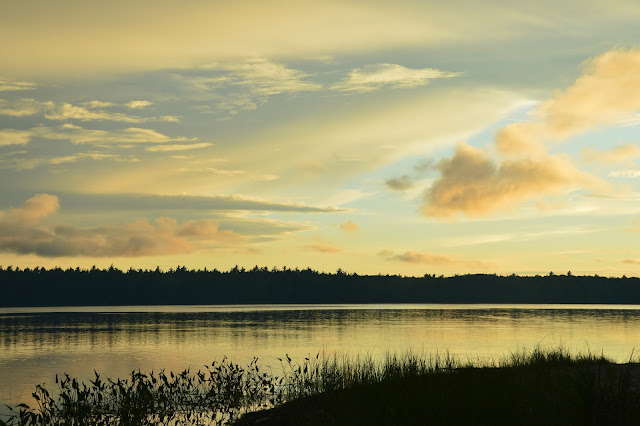 |
| Kejimkujik National Park. JSM, 2015 |
When you feel like you haven't mastered all the ins and outs of something, ... practice some more, they said.
I went camping again.
Primarily for fun, but I was also excited to see what it would teach me about minimalism this time.
I was haunted by a lingering question: why do so many people enjoy living with much less than they actually have access to? Why do people actively choose to "complicate their lives", as my grandmother would say, by leaving the comfort of their homes and putting up a tent in a place with no showers or fridges? Why sleep on the ground when you could be in your bed? Why sit in front of a campfire night after night when you could pick from dozens of TV shows?
Sure, many wonderful things come with camping (see my partial list here), but what about the discomforts? The national park campground we picked this time has no showers within walking distance, so you either have to drive to them or skip washing yourself altogether (better yet, go for a swim in the lake and hope it will suffice).
The silliness of material comfort occurred to me while I was washing my dishes by hand at one of the rare communal sinks. I thought of those "house hunting" TV shows where people claim they "need" a double sink, a king bed, and the washing machine on the main level. Need? Really?
This latest camping trip of ours was complicated by Mother Nature's vagaries. We were "blessed" with torrential downpours. Everything inside the tent became damp and everything outside the tent was soaked: for example, we had to wring our towels before using them. In the group of friends we camped with, everyone's tent had a leak of some sort. Waking up to a drip of cold rain on the face at 2 am is nobody's idea of a good night's sleep. Waking up to a loud bang when a branch the size of your ankle falls on top of the tent isn't much better (true story).
When came time to pack up and leave, it was still raining and not only did we get drenched... mud and pine needles stuck to everything. The tent was so dirty we had to put it up when we got home to hose it down. I can think of better ways to spend my time... especially when I'm tired after three restless nights.
Still... camping keeps its indescribable appeal. Why?
I think I found the answer during a canoe expedition on the river:
Thanks of the hyper focus on basic preoccupations such as obtaining drinking water, maintaining adequate shelter, and keeping warm...
... camping annihilates existential angst.
Try it and tell us if it does it for you.
 |
| Kejimkujik National Park. JSM, 2015 |
Your turn to share about your struggles and victories of the week! What did you resist? Did you donate or get rid of anything? Did you face any challenge? Please comment below! And...
Become a follower of the blog/subscribe by email (top left corner of this page)!
Follow me on Facebook (click here)!





